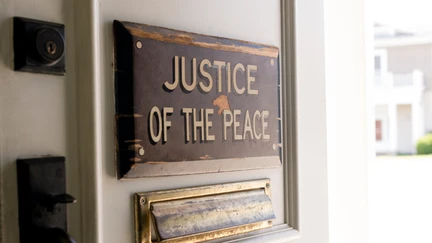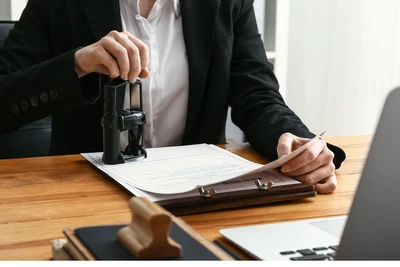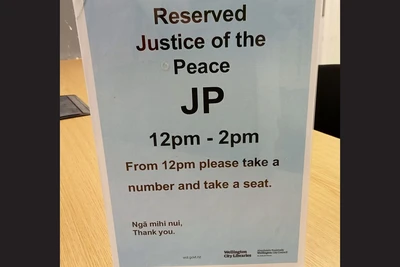Being a Justice of the Peace: interview with Juping Zhou
At some point, most of us will require the services of a Justice of the Peace but many of us aren't sure what a JP does. We had a chat with local JP Juping Zhou to find out more.

Walk into Wellington City Libraries' Te Awe branch at lunchtime Monday through to Saturday and you will see a queue of people waiting to consult the rostered Justice of the Peace (JP). JP service desks run at set times at several of the Wellington City Library branches and the JP service is always in demand.
JP services are unique to Commonwealth countries and last year the Royal Federation of the New Zealand Justices Association celebrated its 100th year of service since its formation in 1924. But what does a JP do, who can become a JP and, importantly how do you go about it?
Juping Zhou is a Justice of the Peace with 20 years of service. In her role as a JP, Juping is also a member of the Wellington JP Association and serves on the Association’s council. As a council member, she organises the JP roster for the JP Service Desks held at Te Awe library. She is also responsible for organising the JP roster for citizenship ceremonies held at Porirua, Kāpiti and Wellington cities. A JP can step in if the Mayor and Deputy Mayor are unavailable to lead new citizens’ oath or affirmation of allegiance.
We asked Juping about being a JP.
WCL: What, or who, inspired you to become a Justice of the Peace?
JZ: As a migrant I was not aware of the JP system. In 1999 I was applying to be a New Zealand citizen. I was looking for a Notary Office, like we have in China, to get some document copies certified as supporting documents for my application. I was told to look in the Yellow Pages to find a Justice of the Peace. I found one near me and made an appointment to go there with my documents and money. When I went to the address the next day, I found myself coming to a residential house instead of an office and an elderly lady greeted me. I was invited to their house, where I found an elderly man there introducing himself as the JP who I was coming to see. He did what was required for me. While he did this, I was even offered coffee and biscuits. I was overwhelmed by all this and only when he asked: “Is there anything else you wish me to do for you?” I realised that I needed to ask how much I owed him. I got the reply: “It is free.”
“Free? I am sorry, but I have not even got a thank-you gift!” The JP said: “A smile will do.”
This impressed me so much. After this experience, I started looking for information on Justice of the Peace and the process of becoming one. I was aware there was a lot of need in the community, especially for migrants who have a lot of things that need to be certified.
I was really inspired by this retired lawyer who performed his JP role to serve the community in his retirement. And that’s how I started the process. I became a JP in 2005.
WCL: What is a JP and what duties do they undertake?
JZ: A Justice of the Peace (JP) in New Zealand is a community volunteer who can perform a number of administrative and judicial functions. The major duties are the administrative part. The judicial part is a different area.
For instance a JP is required to confirm someone’s identity, it’s a legal part of identity confirmation but we’re not involved in the legal process and we do not provide legal advice.
Those in judicial roles can hear minor offences or traffic offences. They can sign off Police search warrants. The Judicial JPs get additional training.

WCL: Why are JPs needed?
JZ: JPs are needed for several reasons. They help make the legal system more accessible to the public by providing services such as certifying documents, witnessing signatures, confirming identity, administering oaths, and officiating ceremonies. Their presence in the community fosters trust in the legal process and ensures that minor legal matters can be handled efficiently without overwhelming the court system.
WCL: How does someone go about becoming a JP?
JZ: The process of becoming a Justice of the Peace for New Zealand starts with a nomination from your local MP. The local MP needs to look at the need in that area, whether there are enough JPs to serve the community. When I applied there were no Chinese speaking JPs in Wellington at all.
So the process starts with your local MP. That’s where you get the application form. You need to have support from two community groups that you have volunteered with.
Then there is a combined interview with a representative from the local Justices Association and a representative from the Ministry of Justice. You then progress to face-to-face and online training and eventually, to officially get provisional approval by the Associate Minister of Justice, you need to pass a test.
Once an application has been signed off by the Governor General, the new JP is sworn in by a District Court Judge
WCL: How long does the process take?
JZ: This entire process could take up to 12 months.
WCL: Once you qualify how are new JPs supported into their role?
JZ: There are 28 JP associations in New Zealand. JPs are encouraged to join their local JP association where they will get on-going support and training. The Wellington JP Association has a new JP Group which meets quarterly to share information and discuss issues. New JPs are also encouraged to sit and observe at JP Service Desks where we have most enquiries.
We have a JP operational manual people can refer to.
WCL: Is ongoing training or registration required?
JZ: The association also provides regular training to all JP members. The Royal Federation of the New Zealand Justices Association has introduced an accreditation system. Every two years, JPs need to attend at least one education session and sit and pass an accreditation exam to keep up to date with JP practices.
WCL: What costs, if any, are associated with this?
JZ: To become a member of a JP Association, there is an annual membership fee. Currently the membership fee for Wellington JP Association is $70.00 per year.

WCL: What personal qualities are required to become a JP?
JZ: You need to be someone who is willing to serve, to be of service to their community.
To become a JP in New Zealand, a nominee must:
- be a New Zealand citizen or resident, listed on the electoral roll
- have a good command of both written and spoken English
- be a confident computer user
- declare all criminal convictions and not be bankrupt
- be supported by two community groups where the nominee does volunteer work
You need to be a people person, well organised and be able to deal with all sorts of people.
I think the devotion to community work is very important.
WCL: For you, what do you find most rewarding about the role?
JZ: Being a JP in New Zealand is incredibly rewarding as it allows me to serve the community, provide support during important legal processes, and contribute to the accessibility of justice.
Because I see so many migrants, I know, from my own experience, I wouldn’t imagine someone like me could be a JP. It’s good that I am breaking down this barrier.
JPs play a crucial role in assisting people with documentation and witnessing signatures, which can be vital for various life events. The sense of fulfilment that comes from helping others and being a trusted member of the community is truly gratifying.
If you want to know more about becoming a Justice of the Peace, or need to consult one you will find more information on these sites:
Wellington Justices of the Peace
Providing information about the Wellington Justices of the Peace Association, the services provided by a Justice of the Peace, where and how to find a JP and other helpful information.
Royal Federation of NZ Justices' Associations
The Royal Federation of NZ Justices Associations is the national body which represents 28 local JP Associations around New Zealand.
Justice of the Peace (Ministry of Justice)
Find out the functions of Justices of the Peace (JPs), their role and responsibilities, and the process for being appointed as a JP.